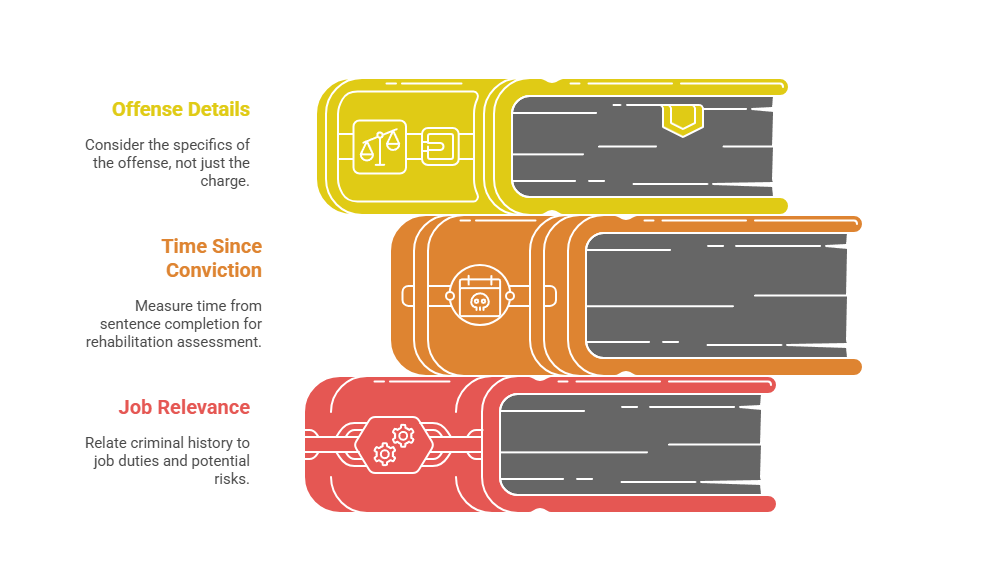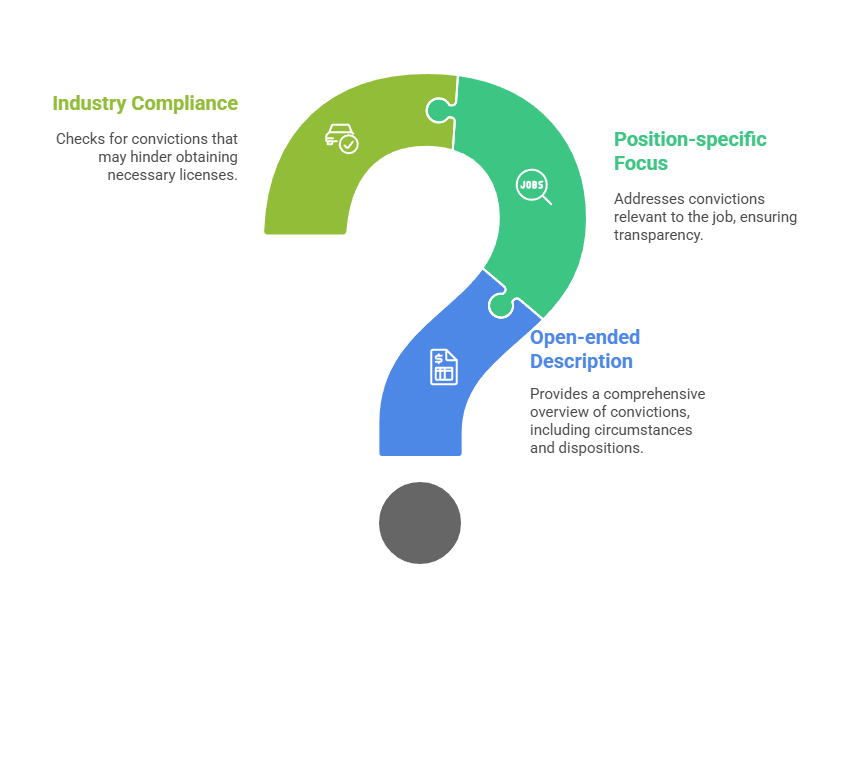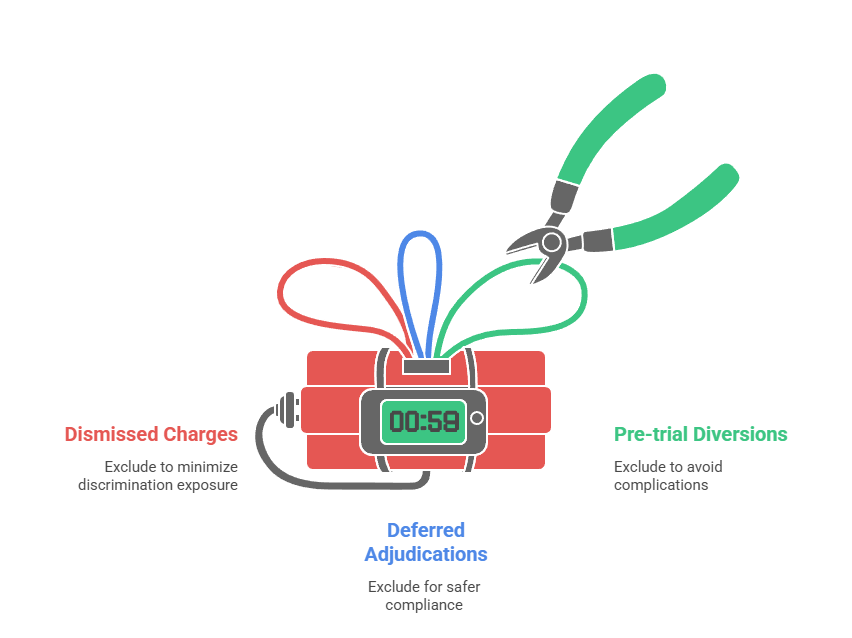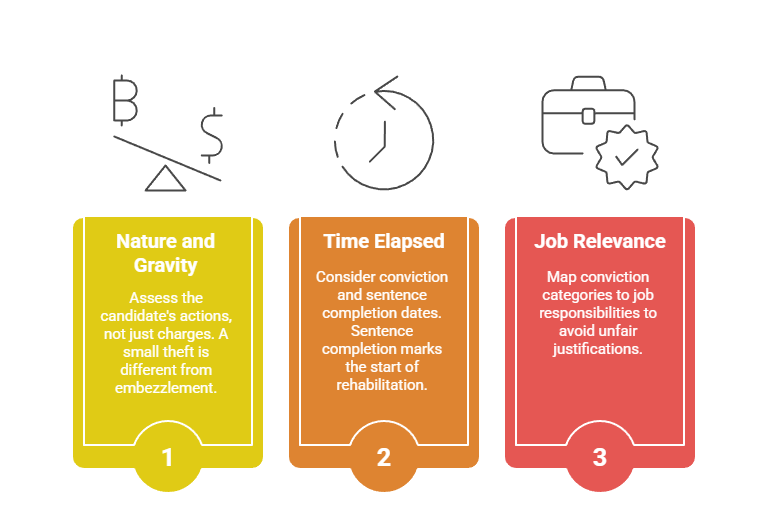Employers face a complex regulatory landscape when inquiring about criminal history, with federal EEOC guidelines, state-specific ban the box laws, and fair chance hiring mandates creating overlapping compliance requirements that vary significantly by location. This guide provides HR professionals with a structured framework for conducting legally compliant criminal background screenings while balancing organizational risk management with fair hiring practices.
Key Takeaways
- Employers in 37 states and 150+ jurisdictions must comply with ban the box laws that restrict when and how criminal history questions can be asked during the hiring process.
- The EEOC requires individualized assessments that consider the nature of the offense, time elapsed, and job relevance before making adverse hiring decisions based on criminal records.
- Federal law prohibits employers from asking about arrests that did not lead to convictions, sealed or expunged records, and certain marijuana-related offenses in states where cannabis is legal.
- "Blanket ban" policies that automatically disqualify all candidates with criminal records violate Title VII of the Civil Rights Act due to disparate impact on protected classes.
- Employers must provide pre-adverse action notices and allow candidates to dispute inaccurate background check information under Fair Credit Reporting Act (FCRA) requirements.
- State laws increasingly limit inquiries to convictions within the past seven years, with California, New York, and Massachusetts imposing particularly strict restrictions.
- Interview questions about criminal history should focus on conviction records relevant to job responsibilities rather than broad inquiries about past mistakes or character.
- Employers who fail to comply with criminal history screening regulations face penalties ranging from $500 to $10,000 per violation, plus potential discrimination lawsuits and reputational damage.
Understanding the Legal Framework for Criminal History Inquiries
The legal landscape governing what employers can ask about criminal dispositions has transformed dramatically over the past decade. As of 2025, HR professionals must navigate a three-tiered compliance structure: federal anti-discrimination laws, state ban the box legislation, and local fair chance ordinances. This regulatory complexity creates significant challenges for multi-state employers who need consistent hiring protocols while respecting jurisdictional variations.
The EEOC's 2012 enforcement guidance on criminal records remains the cornerstone of federal compliance. This framework prohibits employment practices that create unjustified disparate impact on protected classes. Federal data shows that African American adults are 5.9 times more likely than white adults to be incarcerated. Hispanic adults face incarceration rates 3.1 times higher than whites. These statistical disparities mean that blanket criminal history exclusions create adverse impacts that trigger Title VII scrutiny.
EXPERT INSIGHT: It takes more than compliance to ensure fair hiring; it takes balance. Every policy, whether it’s EEOC compliance or Ban the Box, has in mind the simple fact that individuals are to be recognized not in spite of who they are, but because of who they might yet become. The best background checks I’ve observed aren’t strictly policy-driven or compassionate in theory: it takes organizations that can balance policy with passion, where companies follow the rules but where stories are still being listened to. - Charm Paz, CHRP
EEOC Criminal Background Guidelines and Title VII Compliance
Title VII doesn't explicitly prohibit employers from considering criminal history. However, it does prohibit screening practices that disproportionately exclude protected groups without legitimate justification. The EEOC's three-factor "Green Test" provides the compliance framework for assessing whether criminal history exclusions are job-related:

- Nature and gravity of the offense: Evaluate what the candidate actually did, not just the statutory charge category.
- Time elapsed since conviction: Calculate from sentence completion date rather than conviction date, as this represents when rehabilitation began.
- Nature of the job: Connect specific criminal history concerns to actual job responsibilities and risk factors rather than generic position titles.
Individualized assessments represent your strongest defense against discrimination claims. This process requires notifying candidates about potentially disqualifying criminal records and allowing them to provide evidence of rehabilitation, factual errors, or mitigating circumstances. Documentation of this assessment process demonstrates good-faith compliance efforts and creates defensible hiring decisions even when adverse actions occur.
Fair Credit Reporting Act Requirements for Background Checks
FCRA compliance governs the procedural requirements for criminal background checks obtained through third-party consumer reporting agencies. Before requesting a background check, employers must provide a standalone disclosure document and obtain written authorization from the candidate. The disclosure cannot be embedded in employment applications or combined with liability waivers.
The pre-adverse action process requires specific steps before rejecting candidates based on background check results. Employers must provide candidates with a copy of the background report and a Summary of Rights under FCRA. Candidates receive at least 5 business days to dispute inaccurate information. Employers who skip this step face statutory damages of $100 to $1,000 per violation, plus attorney fees and actual damages.
State-Specific Ban the Box Laws and Timing Restrictions
Ban the box legislation has expanded from 8 states in 2015 to 37 states and over 150 cities and counties in 2025. These laws remove checkbox questions about criminal history from initial employment applications. The timing of when you can ask about criminal history depends entirely on the applicant's work location. California's Fair Chance Act prohibits criminal history inquiries until after a conditional offer. New York City delays inquiries until after conditional offers and requires detailed fair chance notices. Texas has no statewide ban the box law, allowing employers to ask about criminal history on initial applications.
| State Tier | Timing Restriction | Example States | Key Compliance Requirement |
| First-Tier | Can ask during interviews, not on applications | Colorado, Illinois, Massachusetts, New Jersey, Oregon | Remove criminal history from application forms but train interviewers for verbal inquiries |
| Second-Tier | Must wait until conditional job offer | California, Massachusetts (most employers), certain NY jurisdictions | Complete all interviews and extend written offers before any criminal history discussion |
| No Restriction | Can ask on initial application | Texas, Alabama, Mississippi, Wyoming | Optional to adopt voluntary fair chance practices |
Multi-state employers face implementation challenges with centralized applicant tracking systems. Your ATS must either display location-specific application versions or remove criminal history questions entirely. Many HR departments choose universal elimination to avoid inadvertent violations from candidates who apply in one state but interview in another.
First-Tier Restrictions: Application and Interview Stage Prohibitions
Seventeen states prohibit criminal history questions on initial employment applications but allow verbal inquiries during interviews. Employers in these jurisdictions can design application forms that omit criminal history questions entirely. Interview-stage inquiries must still follow EEOC individualized assessment principles. You cannot ask "Have you ever been convicted of a crime?" as your opening question and automatically reject candidates who answer affirmatively.
Structure interviews to assess qualifications first, then address criminal history in context of job requirements. This approach demonstrates that you evaluated the candidate's skills and experience before considering criminal records. Template interview scripts help hiring managers maintain consistent, compliant questioning across all candidates. Documentation of the interview process shows regulatory agencies that criminal history was one factor among many rather than an automatic disqualifier.
Second-Tier Restrictions: Conditional Offer Requirements
Nine states require employers to delay criminal history inquiries until after extending conditional job offers. This represents the strictest category of ban the box laws. Employers must complete interviews, select preferred candidates, and extend written conditional offers before asking any questions about criminal convictions.
Conditional offer letters must clearly state that employment is contingent on satisfactory completion of background checks. The California Fair Chance Act provides the model framework. Employers who discover potentially disqualifying criminal history must provide written notice that includes the disqualifying conviction(s), a copy of the conviction history report, an explanation of the candidate's right to respond, and notice that the employer will consider the candidate's response. Candidates receive at least five business days to submit evidence of rehabilitation or errors in the report.
What Employers Can Legally Ask About Criminal Records
The distinction between permissible and prohibited questions creates the most confusion for hiring managers conducting interviews. Federal law and most state regulations permit questions about conviction records that meet job-relatedness standards. Conviction-based questions should reference specific timeframes and offense categories relevant to your position. For a financial services role, you might ask: "Have you been convicted of fraud, embezzlement, theft, or other financial crimes within the past seven years?"
Document your rationale for which conviction categories relate to specific positions. This evidence proves business necessity during regulatory investigations. Industry-specific regulations may impose stricter standards than general employment law. Healthcare employers subject to state licensing boards often face mandatory exclusions for certain convictions. Financial institutions regulated by the FDIC must obtain written consent before hiring individuals convicted of dishonesty-related offenses.
Permissible Questions About Conviction Records
Employers can ask about felony and misdemeanor convictions, provided the questions comply with state lookback period limitations. Most states allow consideration of convictions within the past seven years. Structure your questions to elicit specific information rather than yes/no responses:

- Open-ended format: "Please describe any criminal convictions within the past seven years and explain the circumstances, including dates, charges, and dispositions."
- Position-specific focus: "Have you been convicted of theft, fraud, or financial crimes that would be relevant to this accounting position?"
- Industry compliance: "Are there any convictions that would prevent you from obtaining the state healthcare license required for this role?"
Position sensitivity justifies more extensive criminal history inquiries for roles involving vulnerable populations, financial authority, or security responsibilities. Jobs working with children, elderly individuals, or disabled persons warrant comprehensive background checks. Executive positions with fiduciary responsibilities justify financial crime inquiries. Document the risk assessment process that connects specific criminal history questions to legitimate business needs.
Questions Permitted Only With Proper Context and Individualized Assessment
Pending charges and ongoing prosecutions occupy a gray area in employment screening law. While employers generally cannot reject candidates based solely on arrests without convictions, pending charges may be relevant when they involve serious offenses directly related to job duties. If you choose to inquire about pending charges, frame questions carefully: "Are you currently facing any pending criminal charges that would affect your ability to perform this job's essential functions?"
Multiple convictions for similar offenses reveal patterns that may justify employment decisions. A candidate with five theft convictions over three years presents different risk considerations than someone with a single shoplifting charge from ten years ago. Pattern-based assessments must still comply with lookback periods and job-relatedness standards. Probation and parole status questions are permissible when work schedules, travel requirements, or supervision conditions might conflict with employment.
What Employers Cannot Ask About Criminal History
Prohibited questions fall into two categories: those barred by federal anti-discrimination principles and those restricted by state-specific legislation. Understanding these boundaries prevents costly compliance violations. Blanket questions designed to screen out all candidates with any criminal history fail EEOC standards. Questions like "Have you ever been convicted of any crime?" cast such a wide net that they inevitably create unjustified disparate impact.
The most common mistakes involve asking about arrests without convictions, sealed records, and expunged offenses. These inquiries violate both fair hiring principles and explicit statutory prohibitions in most jurisdictions. State laws strengthen federal protections with explicit prohibitions and financial penalties for violations.
Arrests Not Leading to Convictions and Dismissed Charges
The EEOC explicitly prohibits employment decisions based on arrest records that did not result in convictions. Arrests represent accusations rather than established facts. Using them as screening criteria creates significant racial disparities. California Labor Code Section 432.7 forbids employers from asking about arrests not followed by convictions:

- Dismissed charges: Treat all non-conviction outcomes as off-limits for employment decisions to minimize discrimination exposure.
- Deferred adjudications: While these dispositions don't result in convictions, the safer compliance approach excludes them from consideration.
- Pre-trial diversions: Avoid considering diversion programs that result in case dismissals upon successful completion.
Train hiring managers to ignore arrest information without convictions when reviewing background reports. Consumer reporting agencies often include arrest records with notations like "no disposition found" or "case dismissed." Your review process must identify these entries and exclude them from employment decisions. Document that your adverse action rationale cites only conviction records that meet job-relatedness standards.
Sealed, Expunged, and Pardoned Offenses
Sealed and expunged records receive the strongest legal protections. Federal law and all state statutes prohibit employers from considering these records in hiring decisions. Most jurisdictions require candidates to answer "no" when asked about criminal history that has been sealed or expunged. The legal fiction treats these offenses as if they never occurred.
| Record Type | Can Employers Ask? | Can Employers Consider? | Special Requirements |
| Sealed Records | No | No | Must disregard even if discovered through informal channels |
| Expunged Records | No | No | Candidate legally entitled to answer "no" to criminal history questions |
| Pardoned Offenses | Varies by state | Some states prohibit, others permit | EEOC encourages viewing pardons as rehabilitation evidence |
| Juvenile Records | No (unless tried as adult) | No | Federal law and state statutes prohibit consideration |
Employers who discover sealed or expunged information through informal channels still cannot use it for employment decisions. The legal prohibition extends beyond background check reports to all sources of information. If a hiring manager mentions finding a news article about a candidate's expunged offense, HR must intervene immediately. Juvenile records receive special protections based on the principle that childhood mistakes shouldn't permanently harm adult employment prospects.
Structuring Compliant Interview Questions and Application Language
The practical challenge of compliance lies in translating legal requirements into specific interview questions and application language. Generic legal advice to "follow ban the box laws" leaves your team without actionable guidance. Effective implementation requires standardized question templates, interviewer training protocols, and documentation systems. Your interview question bank should include approved criminal history questions for different job categories. Clear guidance about when each question becomes permissible based on hiring stage and candidate location prevents inadvertent violations.
Version control ensures all interviewers use current templates that reflect recent legal changes. This standardization prevents well-intentioned hiring managers from asking prohibited questions. Consistent screening criteria across similar candidates demonstrates non-discriminatory implementation during regulatory investigations.
Application Form Best Practices and Checkbox Elimination
Remove criminal history checkboxes from all employment applications regardless of state requirements. This universal approach eliminates the risk of showing inappropriate application versions to candidates in ban the box jurisdictions. The compliance benefit of early criminal history information rarely outweighs the discrimination exposure from pre-interview screening.
If your business operates exclusively in states without ban the box laws and you choose to include criminal history questions, use narrow timeframes and offense categories. Include explanatory language that conviction history will not automatically disqualify applicants. Application forms must include required disclosure language for background checks under FCRA. Separate standalone disclosure documents clearly explain that you may obtain consumer reports for employment purposes.
Digital application systems should prevent submission until candidates complete required authorization forms. However, the authorization request must appear only after initial screening stages in ban the box jurisdictions. Program your ATS to trigger background check authorization requests based on hiring stage progression rather than application submission.
Interview Script Templates for Different Hiring Stages
Early-stage interviews in ban the box jurisdictions should focus entirely on qualifications, skills, and job fit without any criminal history discussion. Train interviewers to redirect candidates who voluntarily disclose criminal history: "We appreciate you sharing that information, but we assess all candidates based on qualifications first and discuss background check results later in the process." This response acknowledges the candidate's transparency while maintaining compliance with timing restrictions.
Mid-stage interview scripts in first-tier ban the box states can introduce criminal history questions once candidates pass initial qualification screens. Use open-ended framing that invites candidates to provide context: "Our background check process includes criminal history verification. Are there any conviction records within the past seven years that you'd like to discuss in relation to this position's responsibilities?" Post-conditional-offer discussions should emphasize your individualized assessment process and allow candidates to explain circumstances before making final decisions.
Panel interviews require advance coordinator training to ensure all interviewers understand which questions are permissible at each hiring stage. Designate one interviewer as the compliance lead responsible for criminal history discussions if they're permitted. Other panel members should avoid criminal history topics entirely and focus on their expertise areas.
Conducting Individualized Assessments and Adverse Action Procedures
Individualized assessments transform criminal background checks from automatic disqualifications into fair evaluation processes. The assessment framework requires structured decision-making based on the three Green Test factors: offense nature, time elapsed, and job relevance. Your assessment protocol should create standardized evaluation rubrics while allowing flexibility for candidate-specific circumstances:

- Nature and gravity assessment: Examine what the candidate actually did rather than relying solely on statutory charge categories—a $600 laptop theft differs significantly from $50,000 embezzlement.
- Time elapsed calculation: Consider both conviction date and sentence completion date, viewing sentence completion as when rehabilitation began.
- Job relevance matrices: Map conviction categories to job responsibilities before reviewing individual candidates to avoid pretextual justifications.
Documentation of this analysis provides your primary defense against discrimination claims and regulatory enforcement actions. Template forms guide decision-makers through required factors without imposing rigid scoring that eliminates individual judgment. The goal is defensible consistency where similar candidates with similar criminal histories receive similar treatment.
Implementing the Three-Factor Green Test Analysis
Create offense-relevance matrices that map conviction categories to job responsibilities before conducting any background checks. Financial crimes have obvious relevance to positions involving money handling, accounting access, or budget authority. Violent offenses relate to jobs involving vulnerable populations or unsupervised customer interactions. Drug offenses may be relevant for positions subject to DOT regulations or safety-sensitive manufacturing roles.
Time elapsed analysis should consider sentence completion as the appropriate starting point because it represents when the individual fully satisfies legal obligations. A conviction from 10 years ago with probation that ended 8 years ago presents less concern than a conviction from 6 years ago with probation that ended last month. Job nature and responsibilities must be specifically defined beyond generic position titles to demonstrate genuine job requirements rather than pretextual justifications.
Pre-Adverse Action Requirements and Candidate Dispute Rights
FCRA pre-adverse action notices must include three components: a copy of the consumer report, the Summary of Your Rights Under the FCRA document, and reasonable time for the candidate to dispute inaccurate information. Reasonable time typically means 5 business days, though some employers provide 7-10 days to demonstrate good-faith compliance efforts.
State fair chance laws often impose additional pre-adverse action requirements beyond FCRA. California requires written notices that specifically identify the disqualifying convictions and include standardized disclosure language. New York City mandates a Fair Chance Notice on specific forms provided by the NYC Commission on Human Rights. Candidate responses might include rehabilitation evidence, factual corrections, or mitigating circumstances that change your assessment. Your individualized assessment must consider this additional information before finalizing adverse actions.
Industry-Specific Requirements and Enhanced Screening Situations

Certain industries face heightened criminal history screening requirements that supersede general employment law principles. Healthcare, financial services, education, and transportation sectors operate under regulatory frameworks that mandate specific background checks. These industry-specific requirements represent legitimate business necessity defenses but still require implementation that minimizes unnecessary discrimination. Enhanced screening situations involve positions that create genuine elevated risk: jobs with unsupervised access to vulnerable populations, substantial financial authority, or security clearance requirements.
Document why the position justifies enhanced screening rather than applying maximum background checks to all roles simply because they're permissible. Position-specific risk assessments demonstrate that your screening intensity matches actual job responsibilities. This evidence proves business necessity during discrimination claims or regulatory investigations.
Healthcare and Vulnerable Population Positions
Healthcare employers face overlapping screening requirements from federal exclusion lists, state licensing boards, and facility accreditation standards. The Office of Inspector General's List of Excluded Individuals and Entities (LEIE) prohibits employment of individuals with healthcare fraud convictions in any position compensated by federal healthcare programs. State Medicaid exclusion lists impose similar prohibitions at the state level. Monthly verification against these databases represents mandatory compliance rather than discretionary screening.
State licensing boards establish conviction-based grounds for license denial that extend to unlicensed healthcare workers in many jurisdictions. California's Department of Public Health requires background checks for direct patient care personnel in skilled nursing facilities. Positions involving children, elderly individuals, or disabled persons justify comprehensive criminal history screening including sex offender registries and abuse registries. The National Sex Offender Public Website aggregates state registry data for multi-state searches.
Financial Services and Fiduciary Responsibility Roles
The Federal Deposit Insurance Act Section 19 prohibits FDIC-insured institutions from employing individuals convicted of dishonesty-related offenses without prior FDIC written consent. Covered offenses include fraud, theft, embezzlement, money laundering, tax evasion, and other financial crimes:
- Section 19 lookback period: Seven years from conviction or release from incarceration, whichever is later.
- FDIC consent process: Individuals can petition for employment approval with employer support and rehabilitation evidence.
- State securities requirements: Investment advisers and broker-dealer agents face conviction-based exclusions for regulatory registration.
Positions with fiduciary responsibilities—CFOs, controllers, treasurers, and accounting managers—justify enhanced financial crime screening even when licensing requirements don't apply. These roles involve substantial discretionary authority over organizational assets. Document your risk assessment that connects position-specific responsibilities to financial crime history screening, and apply consistent criteria across similar positions.
Conclusion
Navigating criminal history inquiries requires balancing regulatory compliance, organizational risk management, and fair hiring practices. Employers who develop structured protocols for individualized assessments and maintain detailed documentation create defensible hiring processes. The compliance evolution toward fair chance hiring represents not just legal obligation but sound business practice. As ban the box legislation continues spreading and enforcement intensifies, proactive compliance protects organizations from costly violations while supporting second-chance employment opportunities. But beyond compliance, embracing fair-chance hiring practices communicates a resounding message to the world about the values of your organization—it shows that you are committed to equity, to rehabilitation, to genuine inclusion. Those hiring managers who continue to look beyond the records in order to see the potential in individuals regularly find in them some of their most ardent and productive employees in the long run.
Frequently Asked Questions
Can employers ask about criminal history during the first interview?
This depends entirely on state law where the candidate will work. In 17 states including Colorado, Illinois, and Massachusetts, employers can ask during interviews but not on initial applications. However, 9 states including California and certain New York jurisdictions prohibit all criminal history inquiries until after conditional job offers. Verify specific state requirements before conducting interviews.
What's the difference between asking about arrests versus convictions?
Employers cannot ask about or consider arrests that did not result in convictions under EEOC guidance and most state laws. Arrest records represent accusations rather than proven conduct and create racial disparities that trigger Title VII concerns. Conviction records are generally permissible when they're job-related and within appropriate lookback periods. If background checks include arrest information without convictions, employers must disregard these entries completely.
How do employers conduct individualized assessments for criminal history?
Individualized assessments require evaluating three factors: the nature and gravity of the offense, time elapsed since conviction or sentence completion, and the specific responsibilities of the job sought. Notify candidates about potentially disqualifying convictions and allow them to provide rehabilitation evidence, mitigating circumstances, or factual corrections before making final decisions. Document the analysis of these factors for each candidate to demonstrate consistent treatment and appropriate consideration.
What are lookback periods for criminal background checks?
Most states limit consideration of criminal convictions to the past seven years, though this varies by jurisdiction and offense severity. Violent felonies and sex offenses often remain reportable beyond seven years, while some progressive jurisdictions impose shorter lookback periods for minor misdemeanors. Federal positions and certain industries like healthcare or financial services may have longer lookback requirements based on regulatory mandates.
Can employers ask different criminal history questions for different positions?
Yes, tailoring criminal history inquiries to specific job requirements actually supports compliance by demonstrating job-relatedness. Financial positions justify questions about fraud and theft convictions, while roles involving vulnerable populations warrant inquiries about violent offenses. Document your rationale for position-specific screening criteria before reviewing candidates, and apply the same standards consistently to all applicants for similar roles.
What happens if a candidate lies about criminal history on an application?
Dishonesty about criminal history can justify adverse employment actions, but only after completing proper background check procedures and individualized assessments. Employers must still provide FCRA pre-adverse action notices and allow candidates to dispute report accuracy before finalizing rejections. In ban the box jurisdictions where criminal history questions aren't permitted on applications, candidates cannot be accused of dishonesty for omitting information they weren't required to provide.
Do federal anti-discrimination laws apply to small businesses?
Title VII applies to employers with 15 or more employees, establishing the federal minimum for criminal history screening compliance. However, many state ban the box laws and fair chance hiring requirements apply to smaller employers—California's Fair Chance Act covers employers with five or more employees. Small businesses should verify both federal and state applicability thresholds and adopt the most protective standards.
Can employers automatically reject candidates with any felony conviction?
No, blanket policies that automatically disqualify all candidates with felonies violate EEOC guidance on Title VII compliance. Automatic exclusions create unjustified disparate impact on protected classes without demonstrating business necessity. Employers must conduct individualized assessments that consider offense nature, time elapsed, and job relevance. The only exceptions are statutory exclusions like FDIC Section 19 for banking positions or state healthcare licensing prohibitions.
Additional Resources
- EEOC Enforcement Guidance on the Consideration of Arrest and Conviction Records
https://www.eeoc.gov/laws/guidance/enforcement-guidance-consideration-arrest-and-conviction-records-employment-decisions - FTC Summary of Fair Credit Reporting Act Rights
https://www.ftc.gov/enforcement/statutes/fair-credit-reporting-act - National Conference of State Legislatures: Fair Chance Licensing Reform
https://www.ncsl.org/labor-and-employment/fair-chance-licensing-reform - Society for Human Resource Management: Ban-the-Box Toolkit
https://www.shrm.org/topics-tools/tools/toolkits/ban-box-criminal-record-exclusions - FDIC Section 19 Prohibition and Application Process
https://www.fdic.gov/resources/bankers/section-19-criminal-prohibition/ - National Employment Law Project: Ban the Box Resource Guide
https://www.nelp.org/campaign/ensuring-fair-chance-to-work/

GCheck Editorial Team
Meet the GCheck Editorial Team, your trusted source for insightful and up-to-date information in the world of employment background checks. Committed to delivering the latest trends, best practices, and industry insights, our team is dedicated to keeping you informed.
With a passion for ensuring accuracy, compliance, and efficiency in background screening, we are your go-to experts in the field. Stay tuned for our comprehensive articles, guides, and analysis, designed to empower businesses and individuals with the knowledge they need to make informed decisions.
At GCheck, we're here to guide you through the complexities of background checks, every step of the way.






